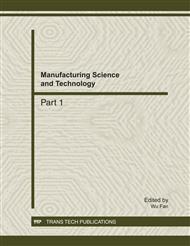[1]
C. Somayaji. First and second law analysis of Oragnic Rankine Cycle, [D]. Amecia: Mississippi State University . (2008).
Google Scholar
[2]
Gurgenci, H. Performance of Power Plants with Organic Rankine Cycles under Part-Load and Off-Design Conditions,. Solar Energy, 36, 1, 1986, pp.45-52.
DOI: 10.1016/0038-092x(86)90059-9
Google Scholar
[3]
Donghong Wei, Xuesheng Lu, Zhen Lu, Jianming Gu. ynamic modeling and simulation of an Organic Rankine Cycle (ORC) system for waste heat recovery,. Applied Thermal Engineering, 28 (2008), 1216–1224.
DOI: 10.1016/j.applthermaleng.2007.07.019
Google Scholar
[4]
G. Kosmadakis, D. Manolakos, S. Kyritsis, G. Papadakis. "Comparative thermodynamic study of refrigerants to select the best for use in the high-temperature stage of a two-stage organic Rankine cycle for RO desalination. Desalination. 243 (2009).
DOI: 10.1016/j.desal.2008.04.016
Google Scholar
[5]
X.D. Wang, L. Zhao, J.L. Wang, W.Z. Zhang, X.Z. Zhao, W. Wu. Performance evaluation of a low-temperature solar Rankine cycle system utilizing R245fa,. Solar Energy, in press.
DOI: 10.1016/j.solener.2009.11.004
Google Scholar
[6]
Liu, B. T, Chen, K. H, Wang, C.C. Effect of Working fluids on Organic Rankine Cycle for Waste Heat Recovery., Energy, 29, 2004, p.1207–1217.
DOI: 10.1016/j.energy.2004.01.004
Google Scholar
[7]
Maizza, V., and Maizza, A. Unconventional working fluids in organic rankine-cycles for waste energy recovery systems., Applied Thermal Engineering, 21, 3, 2001, pp.381-390.
DOI: 10.1016/s1359-4311(00)00044-2
Google Scholar
[8]
P. J. Mago, L.M. Chamra, K. Srinivasan, and C. Somayaji. An examination of regenerative organic Rankine cycles using dry fluids, [J]. Applied Thermal Engineering. 28 (2008) 998-1007, doi: 10. 1016/j. applthermaleng. 2007. 06. 025, (2008).
DOI: 10.1016/j.applthermaleng.2007.06.025
Google Scholar
[9]
Somayaji, C., Mago, P. J., and Chamra, L. M. Second Law Analysis and Optimization of Organic Rankine Cycles., Proceedings of IMECE2006 ASME International Mechanical Engineering Congress and Exposition, November 5-10, 2006, Chicago, Illinois, USA.
DOI: 10.1115/power2006-88061
Google Scholar
[10]
Hung, T.C., Shai, T.Y., and Wang, S.K. A Review of Organic Rankine Cycles (ORCs) for the Recovery of Low-grade Waste Heat., Energy, 22, 7, 1997, pp.661-667.
DOI: 10.1016/s0360-5442(96)00165-x
Google Scholar


